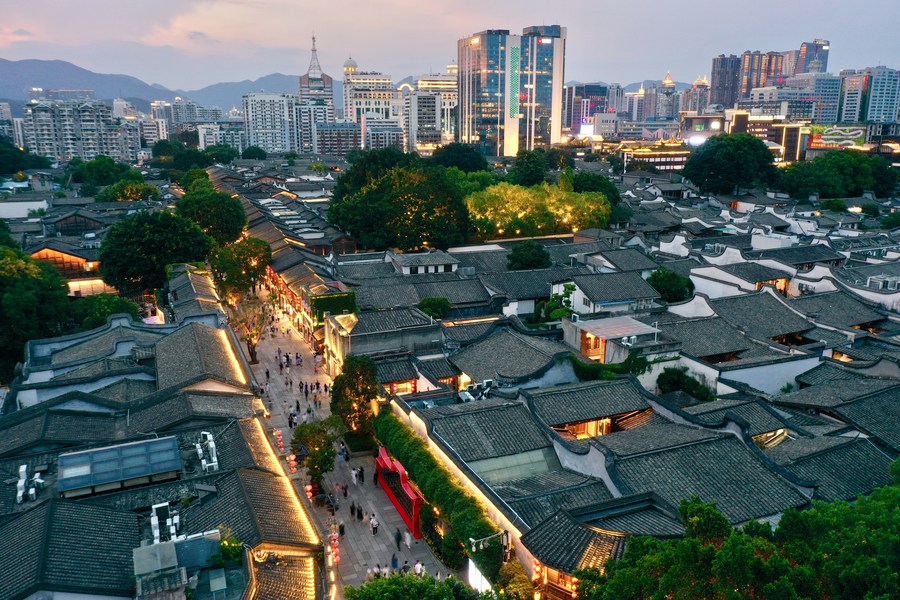
Aerial photo taken on July 10, 2021 shows a view of the historical and cultural block of Sanfangqixiang (Three Lanes and Seven Alleys) in Fuzhou, southeast China's Fujian Province. (Xinhua/Jiang Kehong)
BEIJING, May 27 (Xinhua) -- Sanfangqixiang (Three Lanes and Seven Alleys), an ancient block in downtown Fuzhou, capital of Fujian Province in east China, has held a special place on President Xi Jinping's mind for over three decades.
After leaving his post in Fujian for around 20 years, Xi revisited the neighborhood in 2021 during an inspection tour. His concern for the block of old lanes and alleys is for good reasons.
Lauded by locals as a "microcosm of nearly half of the Chinese modern and contemporary history," the block, stretching for 45 hectares, has nurtured over 400 household names in China.
The green tiles, unique saddle-shaped white walls, and exquisite window and door carvings make the complex a "museum of the architecture of the Ming and Qing dynasties."
Visitors to the bustling block today could hardly imagine that the entire block was once on the brink of demolition. But thanks to Xi, then Party chief of Fuzhou, the old buildings of more than 1,000 years survived the bulldozers.
In the late 1980s, the former residence of Lin Juemin, a renowned revolutionary hero, in Sanfangqixiang was due to be razed to the ground to give way to a development project. At this crucial moment, a meeting on cultural relics protection was held in the old building.
Xi made the final decision at that meeting: "We must protect, repair, and make good use of the city's cultural relics in our hands. Not only should we prevent them from being damaged, but also help them flourish and pass them on to future generations."
Shortly after the meeting, the restoration of Lin's residence was completed, and other historical buildings in Sanfangqixiang were also put under protection.
During his tenure in Fuzhou, regulations on cultural relic preservation were promulgated, and the cultural heritage bureau and an archaeological team were established. Xi's work laid the foundation for the long-term protection of the city's cultural heritage.
Thanks to three decades of preservation work, Sanfangqixiang glows with new vitality today. The block is now home to over 200 ancient buildings or complexes, and 15 state-level major cultural relics units.
"Protecting ancient buildings and cultural relics is about preserving history and a city's cultural heritage, and keeping the intangible fine tradition of renowned historical and cultural cities alive," Xi wrote in a foreword for a book on old houses in Fuzhou, which was published 20 years ago.
"History and culture are the souls of a city. We should protect the heritage of cities as we cherish our own lives," Xi once said. ■




